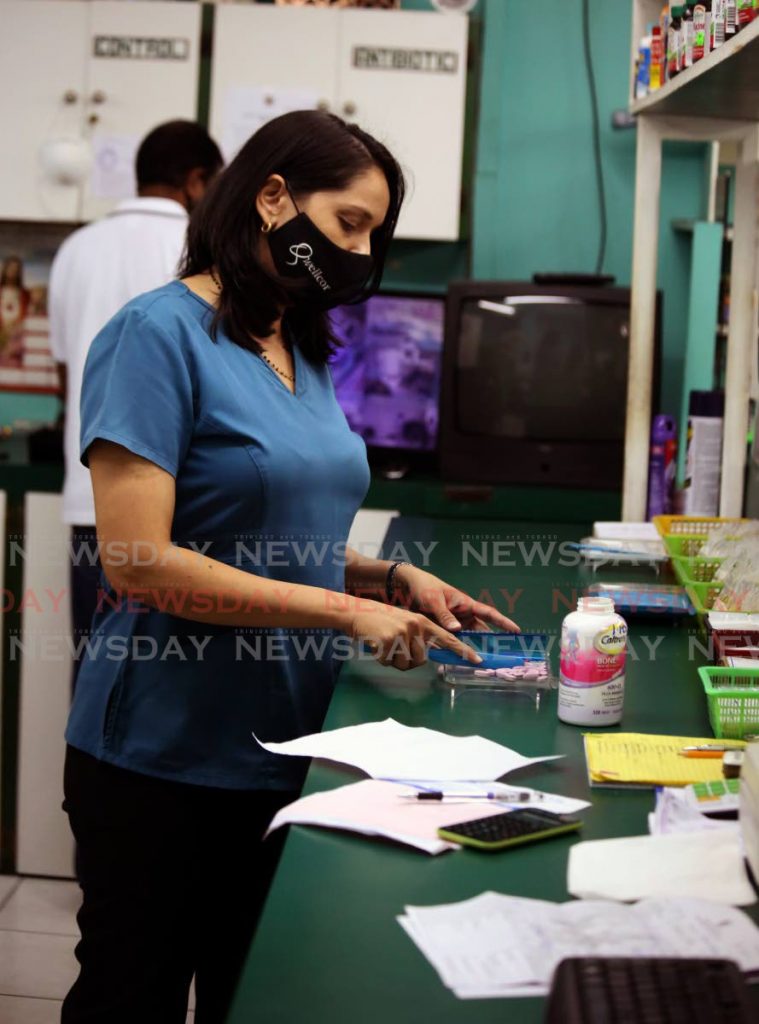Essential workers conquer fear of virus

When Farihah Lochan leaves her job at the 24-hour NP gas station at Caroni Savannah Road to head home, she is already thinking about how to make sure her exposure to the outside world doesn’t infiltrate her home.
She removes her clothing and leaves everything near the door to wash later in hot water, then heads to the shower, before even sharing a cuddle with her husband and baby.
Lochan is one of the many people considered essential workers by the Government, who are allowed to continue working despite consistently high numbers of new reported cases of covid19.
“It is a very scary situation. You are hearing a lot of rumours going around about the current situation, and it is very frightening and eye-opening that a lot of the public is passing away due to the virus,” Lochan said in an interview with Newsday.
While media coverage has focused on frontline healthcare staff, workers like Lochan face the brunt of exposure to the public, with added anxiety caused by not knowing who – among their hundreds of customers daily – may have covid19.
Lochan suffers from asthma. Throughout her shift, she may deal with hundreds of people who, when they stop for gas, often pop into the station’s quick shop to make a purchase. For Lochan, routine tasks like accepting customers' payments, restocking shelves or simply being close by to help a customer find an item now carries the significant risk of her contracting covid19.
With the alarming increase in covid19 cases, hospitalisations and deaths, thousands of other people have once again been catapulted to the frontlines of the pandemic – because they are recognised as “essential workers.”
Fear over workplace exposure
At a press conference the week before last, the Prime Minister further decreased the staff allowed to continue going out to work in the public sector to the most essential services.
As Anastacia Brown* watched as fewer of her colleagues turned up to their offices at the Ministry of Social Development, she started to feel afraid. She asked to be allowed to work from home, but this was denied, even though Brown said her job could be done remotely.

She said she is scared of contracting covid19 at work and involuntarily infecting her toddler, ailing husband and elderly parents.
“I might be fine, but I could very well kill my husband, and then what would they do? The sensitivity towards my situation is not there...I’m scared!”
One of Brown’s colleagues, John Davis,* said the ministry’s project implementation and policy unit, library, and HIV departments were among those that could work remotely.
“Now more than ever it has been extremely scary...There are departments that have absolutely nothing to do with those essential services that are provided here. They could work from home.
“I just feel like we are being bullied. They’ll wait until someone unfortunately dies to follow the directive.”
PC John Michael* described working in a pandemic as a “bittersweet” experience. He is thankful he has a job and can provide for his family, but said it was scary being exposed to the virus every day, since he cannot “pick and choose” the people he has to deal with.
To make matters worse, Michael said he has a newborn son at home, and he would be devastated if he inadvertently infected his baby with the virus.
“Knowing I have to come to work and mingle with all these different people and then go back home to my family is just so frightening. It would be a burden to me to know I carried this virus home to my family.
"Almost a week now I have not kissed my son or my wife. I’m trying to avoid that as much as possible until I figure out a way to best treat with the situation to keep the family safe.”
Michael said in addition, he is stressed about the financial strain he could be placed under if he contracts the virus and is forced to quarantine. Michael lives in a small apartment with his family and said isolating himself there would be impossible, so he would have no choice but to rent an apartment where he could stay away from his family.
Grateful to work but still afraid
Rahesh Mohammed works at a pharmacy in Central Trinidad. He too was grateful to have a monthly source of income, especially at a time when so many people have lost their jobs. But he too battles fear.
“I feel scared and anxious often. Coming out of my home for six to seven days a week means immediately placing my immediate family members at risk.”

Mohammed said getting the public to follow health protocols remains a challenge, despite the increase in covid19 cases and deaths.
“We still have to regularly remind persons about properly wearing their masks and social distancing.”
He said attending to customers and handling their prescriptions was frustrating when those customers may be covid19-positive and pretending their symptoms are those of ordinary flu. To protect himself, Mohammed said he often “double masks,” and washes his hands after every customer interaction.
A few weeks ago, Mohammed took the AstraZeneca vaccine, and is calling on more people to follow suit.
“We have to restore our faith in science if we are to comprehensively combat covid19.”
Like Mohammed, PriceSmart employee Stacy Persad* said she was grateful to have a salary. But Persad, the single mother of two said she felt conflicted because she was “almost disappointed” when PriceSmart’s doors remained open after speculation on May 7 that the company’s operations would be shut down because of overcrowding.
She said a lot of her colleagues and friends who are working at other supermarkets are experiencing burnout.
“More flexible rotation is needed for supermarket workers. Right now it feels like our lives are less important.”
She said being an essential worker is a risk, but she feels a bit safer now that PriceSmart has improved its management of crowds after almost being shut down.
She said she hopes her company will consider providing transport for staff, especially at night, as she noticed there are fewer taxis on the road, and many are raising their fares. This, she said, would also minimise the risk of employees contracting the virus when using public transport.
Psychologist on lockdown blues
Psychiatrist Dr Varma Deyalsingh said covid19 has caused an increase in mental health problems worldwide, with people experiencing “lockdown blues” and burnout.
“As a mental health provider, I am concerned (about) this increase. This is a pandemic within a pandemic and will be seen long after covid has ended.
“Some complain of burnout. Some causes are unfair treatment at work; unmanageable workload; lack of clarity; lack of communication and support from staff and administration; unreasonable time pressure; interpersonal conflicts and imbalance between reward and effort.”
He said employers must ensure both a physically and mentally safe environment for employees.
To do this, he implored employers to ensure their company’s workspace has adequate ventilation.
He advised employees to report their employers to the Occupational Safety and Health Agency (OSHA) or the Ministry of Labour if they make no effort to ensure covid19 health protocols are in place. He said issues such as overcrowding, no social distancing, coworkers not wearing masks and the lack of provision of soap or sanitiser can be deemed an unsafe work environment.
He also advised employers to implement mental-health sensitisation sessions for staff so they could recognise and seek treatment to better manage their emotional and mental health challenges.
“Domestic abuse, depression, adjustment disorders, anxiety and substance abuse are all increasing during covid (because of) the uncertainty of when will it end, what will happen to our children, the fear of losing one’s job, financial problems and now the fear of taking the vaccine.”
He said 60 per cent of people who suffer from depression never seek help because they don’t recognise it, and failure to treat unhealthy emotions could lead to an increase in “desk rage.”
“Stress can manifest as bodily or somatic symptoms – men have back pains and women may have migraines and neck pains...There’s something called fibromyalgia – all these are signs of depression which may not be recognised.”
He also said measures put in place to curb the spread of the virus had led to a “lack of coping mechanisms and relaxing pastimes” like shopping, going to the gym and beach limes, which may exacerbate the mental health fallout.
Deyalsingh suggested employers put structures in place to help keep employees socialised.
"Employers can use TikTok as a tool for competitions (such as) dancing, singing, etc, among our workers to keep connectivity."
To further increase employees' social interaction, he suggested staff exercise together using online platforms.
"Exercise releases endorphins, hormones which help improve your mood."
Deyalsingh, who is also an independent senator, said even before covid19 he advocated for work-at-home policies.
But he also said covid19 has caused businesses economic hardship, leading to a “trickle-down effect of stress from boss to worker” and a slew of issues further affecting the mental health even of people working from home.
“Workers complain they are bombarded by e-mails outside working hours. They are overwhelmed by children at home.
"If workers think they have an unfair workload they need to say so respectfully and offer suggestions on how to get tasks done.”
"Covid fog" is another issue Deyalsingh said employers and employees should look out for.
“Covid fog is a cognitive decline we are seeing where persons are finding it difficult to think and concentrate, and even memory is affected. We need to be aware of this phenomenon and make allowances.”
Deyalsingh said 20 per cent of all employees would experience a mental health problem in their lifetime. He suggested employers hire a “social worker buddy” to reach out to employees who are working from home to help them manage stress and depression.
*Name changed to protect identities

Comments
"Essential workers conquer fear of virus"